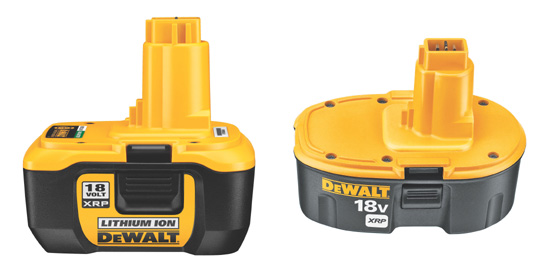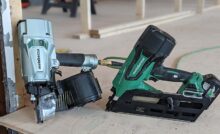Li-Ion Vs NiCd Cordless Batteries




Li-Ion Vs NiCad Battery Debate
Readers continue to send in emails asking questions about Lithium-Ion (Li-Ion) and Nickel Cadmium (NiCad or NiCd) cordless tool battery packs. So I reached out to Jason McNeil, Product Manager at DEWALT and Derek Vicko, Senior Product Manager at PORTER-CABLE and asked them to help answer some of your questions.
Interview with Jason McNeil – DEWALT
“What are the biggest benefits of the Li-Ion Battery Platform?”
- Limited Self Discharge – Li-Ion batteries are able to hold their current level of charge over extended periods. If you stop working Friday afternoon with 50% battery life remaining that same 50% battery life will be present Monday morning when you return to work. This is a huge benefit over NiCd batteries which might be almost fully drained when you return to work that Monday due to self discharge.
- Lighter Weight – Li-Ion batteries are lighter and smaller compared to NiCd batteries. This reduces fatigue and stress on the user and allows for smaller tools that are able to get into tighter spaces.
- Higher Number of Recharges – Li-Ion batteries can be charged up to twice as many times as comparable NiCd batteries. DEWALT’s XRP batteries can be charged as many as 2,000 cycles where a NiCd might be 800 to 1,000 cycles.
“What are the biggest benefits / advantages of the NiCad Battery platform?”
- Proven Technology – NiCd batteries have been around for 10 to 15 years. They are a very robust, stable mature technology that suppliers know well.
- No Electronics – NiCd batteries do not have built-in electronics like Li-Ion batteries. Ultimately this means that NiCd batteries can be pushed to their limit on amp draw, temperature and discharge while Li-Ion batteries are constantly monitored by built-in electronics. Those electronics can shut down a Li-Ion battery if it’s pushed two hard which can be a bit annoying and difficult to deal with.
- Tough – NiCd batteries are just plain tough! When it comes to extreme temperatures and heavy amp draws the NiCd battery keeps performing. NiCd batteries can make a big difference in larger tools like saws and high torque drilling applications where amp demand is high.
“Which battery type is best for users that live in cold areas such as here in New England?”
- Consumers that live in extreme cold or hot areas are going to get an advantage from NiCd batteries. NiCd batteries are not affected by extreme temperatures in the same way that Li-Ion batteries are. This doesn’t mean that Li-Ion batteries can’t work in those types of climates, however it does mean that the consumer has to adjust his or her routine to keep their batteries from reaching those extreme temperatures.
“Should consumers shy away from buying NiCd systems for fear that they will be phased out in the near future?”
- NiCd battery systems will be around for some time to come. NiCd is a cheaper, more stable platform that continues to perform well in the cordless tool industry. Consumers should choose a battery platform on their needs as both technologies will be available for quite some time.
“Are there certain tool types (i.e. drills vs saws) that are better suited to a certain battery type?”
- Li-Ion batteries are making a big impact on cordless tool ergonomics. Because of their lighter weight and smaller size Li-Ion batteries are a natural match for cordless drills. While other tool platforms can benefit from Li-Ion the biggest winner seams to be drills and impact drivers.
Interview with Derek Vicko – PORTER-CABLE
“What are the advantages/disadvantages of Li-Ion and NiCd in various battery voltages (for example, 12V vs 18V)?”
- Lithium Benefits
Regardless of voltage, the benefits of Lithium-Ion are compact, lighter weight tools that hold a charge longer versus NiCd technology. A Lithium-Ion product can offer increased access to applications, more control, less fatigue, and superior balance when compared to a NiCd equivalent. In the 12V category, the benefits of Lithium really shine since the entire tool can be extremely compact and light weight. The new 12V Max product line from PORTER-CABLE is a great example of how Lithium-Ion technology can power compact and powerful tools that offer greater access, control, and ergonomics then previously offered through NiCd solutions.
- NiCd Benefits
Due to the electronics required to manage Lithium-Ion systems safely and reliably, there is a price premium for the benefits. The premium is less for 12V Lithium-Ion since fewer electronics are required to manage three Lithium-Ion battery cells versus the five cells for 18V. In addition to being lower cost, NiCd technology can be a good option for users who tend to operate frequently in extreme hot or cold temperatures. NiCd batteries will experience lower efficiency losses at the upper and lower bands of the temperature spectrum.
- So…..Which is Better?
In the end, it boils down to the needs of the end user in terms of the available budget, application needs, and climate. PORTER-CABLE’s 18V System was designed to allow users the flexibility to use any cordless tool with PORTER-CABLE Lithium-Ion or NiCd batteries. With this type of system, users can fine tune their tools for the application and continue to evolve their system as their needs change over time.
Recent Posts
Framing Stick Nailer vs Coil Nailer
Which is Better a Stick Nailer or Coil Nailer? Framers have many choices in nailers…
How Many Roofing Nails Per Square of Shingles
Estimating How Many Nails for a New Roof When it comes to estimating materials for…
Composite / PVC Decking – Layout Tips & Advice
Composite / PVC Decking Layout Tips and Advice Composite and PVC decking have really changed…
Benefits of an ERV System (Energy Recovery Ventilator)
Benefits of ERV Systems (Energy Recovery Ventilator) If you're building a new home or doing…
Vermiculite Attic Insulation Abatement
Vermiculite Attic Insulation If your home was built before 1990 there is a chance it…
Nuisance Tripping of AFCI (Arc Fault) Circuit Breakers
Arc Fault (AFCI) Circuit Breakers Tripping Often An arc-fault circuit interrupter (AFCI) or arc-fault detection…

View Comments
Nicely done
Wondering if you can answer which battery type might be best for a home DIY person who would use his 18V drill heavily for a week or so, not need it again for several months, and then only for light duty now and then before a next major project perhaps nine moths after the first one? My current two Rockwell cordless batteries only lasted me about two years under that type of usage before I'm needing to get a new set. A reply direct to my email would be appreciated. Thanks.
Definitely should buy a lithium ion platform. I would recommend porter-cable or dewalt as they will be in the right price range.